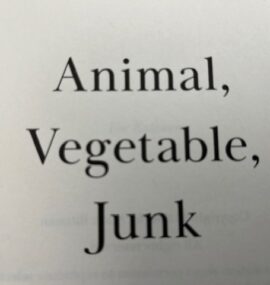Our obesogenic environment
We Americans live in an obesogenic environment. Omnipresent ultra-processed food promotes overeating. In his latest provocative book, Animal, Vegetable, Junk, author Mark Bitmann chronicles the history of food and explains that the food industry created foods so tasty and pleasurable that we eat more than we need. As products of our evolution, we humans are hard-wired to eat what we can and when we can, with insufficient ability to counter overeating.
Bitmann identifies three themes: 1) The food industry is not organized to produce nutritious food in a sustainable manner. 2) Healthy eating involves emphasizing desirable foods, going light on optional foods, and avoiding undesirable foods. 3) The food industry has shifted our thinking from foods as plants and animal products that we prepare and eat in favor of branded food-like materials that come in boxes and which are designed to be eaten to excess.
The food industry is not organized to produce nutritious food in a sustainable manner
Sustainable food production relies on healthy soil. The withdrawal of nutrients (via human food, crop waste, water runoff, erosion) must be replaced regularly. Techniques include fallowing, cover cropping, crop rotation, companion planting, and fertilization. Modern farming improves soil fertility largely with synthetic fertilizers. Today’s agriculture could provide enough food for everyone globally if it were to prioritize soil health rather than global commodity markets. Servicing these markets ignores the value of local communities as witnessed by the presence of ghost towns on the American prairie and other rural areas. About 40 percent of US cropland is used to produce corn that’s processed into ethanol as a gasoline additive rather than producing food for people. Federal support through the US Department of Agriculture and the Small Business Administration tends to help large, corporate food producers rather than small farmers who grow food that’s recognizable as such and in a sustainable manner. Agroecology supports farming as a dignified way to live, creating grounded, family oriented, life-giving work. The Green Revolution required access to credit and equipment that’s often unavailable to small farmers. Industrial agriculture is an extractive industry that depletes the soil itself along with nutrients essential for plants. Soil erosion and water pollution impacts are passed on to the public at large as externalities. Industrial agriculture generally ignores emerging properties of complex living systems. This reflects agriculture’s heritage of reductionist science which focuses on the parts and ignores the whole. Reductionist science embodied in nutrition labels promotes the idea that food composition is all that matters, leading to misplaced emphasis on calories.
Healthy eating emphasizes desirable foods, goes light on optional foods, and avoids undesirable foods
Bittman suggests that those who seek to Eat Better identify broad categories of food as 1) desirable, 2) optional, and 3) undesirable. Desirable foods include vegetables (leafy greens, multiple colors, roots, tubers), fruits; whole grains (including whole-grain flour); legumes; nuts; seeds; and water. Optional foods include oils, fats, meat, dairy, seafood, eggs, coffee, tea, alcohol. Undesirable foods include ultra-processed foods (such as chemically extracted oils and fats, sugars, flours), industrially processed animal products, junk food, sweets, sugar-sweetened beverages.
The food industry has shifted our thinking about foods
Manufacturing foods in factories fundamentally changed how Americans eat and what we eat. Food branding created from often meaningless slogans and jingles supersedes the nutritional value real foods. The food industry normalized the idea that food comes in a box rather than from plants or animals.
The food advertising budget for the US is about $40 billion annually, far higher than that for chronic disease prevention and health promotion. Nearly sixty percent of the calories eaten by American comes from ultra-processed foods, the abundance of which probably contributes to the 30 percent weight gain by American adults (average of 25 pounds per person) over the last three decades of the 20th Century.
What to do
In my opinion, the food industry seeks to make a profit regardless of the negative consequences to the environment and public and personal health. You can forge your own path by emphasizing vegetables, fruits, whole-grains, beans, nuts, and seeds, plus drinking plenty of water.








